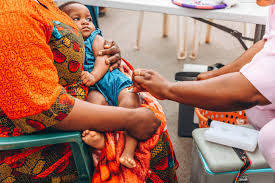
Daniel Otera
Nigeria has played a crucial role in a groundbreaking clinical trial, ushering in a new era of hope for the world’s youngest victims of malaria. The approval of the world’s first tailored malaria treatment for newborns and infants weighing under five kilograms marks a historic milestone, celebrated by health experts across Africa. This innovation promises to shield vulnerable babies from a disease that has ravaged the continent’s youngest populations for decades.
Nigeria bears the heaviest malaria burden globally, accounting for approximately 27% of all malaria cases worldwide and 31% of malaria-related deaths (World Health Organization [WHO], 2022). Children under five years old are particularly vulnerable, as their developing immune systems make them more susceptible to the devastating effects of the malaria parasite (United Nations Children’s Fund [UNICEF], 2023). This age group forms the most at-risk population, with severe implications for public health.
One of the most pressing challenges in the fight against malaria in Nigeria has been the lack of approved treatments for infants weighing less than five kilograms. Health workers often have to adjust dosages from medicines designed for older children, a risky practice that can lead to dangerous overdoses, toxicity, and further harm (News Agency of Nigeria, 2025). This glaring gap in treatment options highlights the urgent need for age-appropriate, safe, and effective treatments for Nigeria’s most vulnerable citizens.
However, change is on the horizon. A breakthrough malaria treatment, an infant-friendly version of artemether-lumefantrine, has been developed. This formulation dissolves easily in breast milk and has a sweet flavor, making it easier to administer to newborns. The drug, created by Swiss pharmaceutical giant Novartis in collaboration with the Medicines for Malaria Venture (MMV) under the PAMAfrica consortium, marks a historic first. Novartis has committed to supplying the treatment primarily on a not-for-profit basis, aiming to broaden access in malaria-hotspot regions like Nigeria.
The clinical trials for this new treatment involved eight African countries: Nigeria, Burkina Faso, Côte d’Ivoire, Kenya, Malawi, Mozambique, Tanzania, and Uganda. These countries worked together to pave the way for the drug’s approval by Swiss regulators. Now, participating nations are poised to fast-track their own approvals through the Swiss agency’s Marketing Authorisation for Global Health Products procedure. This fast-track mechanism ensures the swift rollout of the drug, potentially saving thousands of infant lives annually.
The Africa Centres for Disease Control and Prevention (Africa CDC) hailed Nigeria’s contributions to this significant achievement. In a statement released on Sunday, Dr. Jean Kaseya, the Africa CDC Director-General, praised the development as a major step forward in the fight against malaria. He emphasized that “even the smallest and most vulnerable infants can now access safe and effective treatment,” and noted that the trial’s success would “save thousands of young lives.”
Dr. Ngashi Ngongo, Principal Advisor to the Africa CDC Director-General, highlighted Africa’s growing prowess in health innovation. He commended Nigeria for playing a key role in the success of the trials and praised the collaborative efforts of the other seven countries. Dr. Ngongo also stressed the importance of continued collaboration to ensure that such innovations reach all affected populations across the continent.
The Africa CDC has pledged its support for the integration of the new treatment into national health systems across Africa, including Nigeria. The agency is committed to speeding up regulatory approvals, revising clinical guidelines, and training frontline health workers. Additionally, efforts will be made to guarantee fair distribution of the treatment, especially in remote rural areas where malaria remains unchecked.
These measures are critical, given that sub-Saharan Africa bears over 90% of the global malaria burden. Without proper intervention, infants in low-weight categories face mortality rates up to 50% higher (WHO, 2022). The introduction of this new treatment could reduce these mortality rates significantly, particularly in high-burden regions like Nigeria.
Malaria remains a major public health concern in Nigeria. In 2021 alone, the country reported approximately 68 million malaria cases and 194,000 deaths, with a disproportionate number of these fatalities occurring among children under five years of age. The introduction of an approved treatment for infants under five kilograms fills a crucial gap in malaria care for Nigeria’s youngest population (WHO, 2022).
Novartis, in collaboration with the Medicines for Malaria Venture, developed this new formulation of artemether-lumefantrine, a widely used antimalarial drug. Designed specifically for infants weighing less than five kilograms, this treatment is sweet-flavored and dissolves easily in breast milk, prioritizing ease of administration and safety. Clinical trials have shown that this treatment could reduce infant malaria fatalities by up to 20% in high-burden regions (Novartis, 2025; Medicines for Malaria Venture, 2025).
As the new treatment becomes available, the Africa CDC has pledged strong support for its introduction, emphasizing its potential to improve health outcomes across the continent. The agency is working to integrate this treatment into national health systems and enhance training for healthcare workers in Nigeria. The CDC’s efforts, which draw from successful programs in Kenya and Uganda, aim to increase adherence to treatment protocols. Experts anticipate that such initiatives could boost adherence rates in rural areas from the current 60-70% to over 90% (Africa CDC, 2025).
Novartis’s not-for-profit approach to the distribution of the drug serves as a model for future collaborations, fostering greater self-reliance in African health research and development (Novartis, 2025). By ensuring broader access to this innovative treatment, the partnership holds the potential to significantly reduce the global malaria burden.
For Nigeria, this treatment not only affirms the country’s role in advancing global health but also offers a tangible solution to a long-standing public health crisis.
This innovation provides hope for the nation’s most vulnerable citizens, newborns and infants and represents a decisive step toward reducing infant mortality due to malaria.
As Dr. Kaseya aptly stated, this is about ensuring “even the smallest” have a fighting chance against one of the world’s most deadly diseases.
